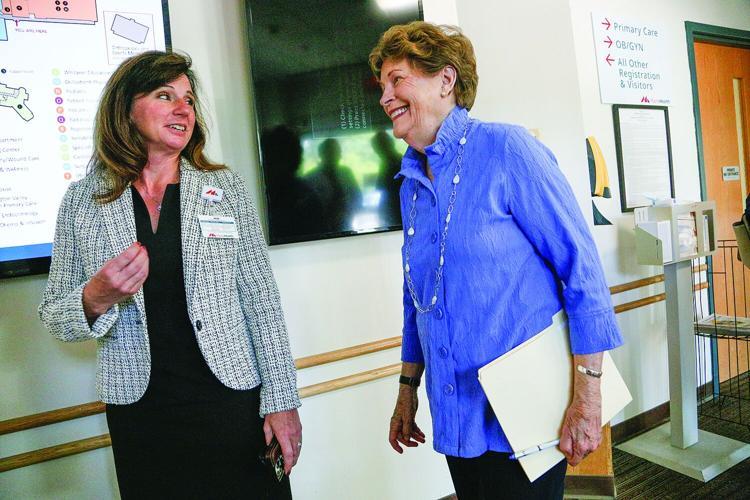
U.S. Sen. Jeanne Shaheen (right) talks with Hospital President Tricia Costigan near the main entrance before a tour during a visit to MaineHealth Memorial Hospital in North Conway on Aug. 12. (RACHEL SHARPLES PHOTO)
CONWAY — U.S. Sen. Jeanne Shaheen (D-N.H.) visited MaineHealth Memorial Hospital in North Conway on Tuesday, Aug. 12, and discussed impacts of health care cuts in the Republican-led “Big Beautiful Bill,” termed by Democrats as the “Big Beautiful Betrayal.”
At Memorial, Shaheen was given a tour by hospital president Tricia Costigan, then met with staff for a roundtable discussion to address impacts of the “One Big Beautiful Bill Act,” which President Donald Trump signed into law last month.
“I’ve been doing a series of discussions around the state. At first, it was to try and stall passage of that bill, which didn’t happen, sadly; but now,” said Shaheen at the outset of the half-hour forum, “really it’s to get a better sense of what you think, how you’re preparing for the changes that will come as a result, what you think we ought to be thinking about in Washington, and to hear any ideas you have or ways to mitigate some of the harmful impacts.”
The act is projected to significantly impact health care access and affordability, particularly for low-income individuals and families. The bill’s primary impact stems from cuts to Medicaid and changes to the Affordable Care Act. These changes are expected to lead to millions losing health insurance coverage and increased costs for those who remain enrolled.
During her visit to Memorial, Shaheen fielded questions and asked for input from MaineHealth Memorial staff.
Specific issues highlighted were the high costs of medications, the impact on behavioral health, and the administrative challenges posed by Medicare Advantage plans. The conversation also touched on the need for telehealth continuation, maintaining 340B funding, and addressing student loan debt for physicians to ensure access to health care in rural areas.
Participating were Costigan; psychiatric mental health nurse practitioner Melissa Kanter, who shared the impact on behavioral health patients; nurse anaesthetist Ashley G. Cyr, who spoke about patients in the pain management program; Chief Nursing Officer Kris Dascoulias, RN; Dr. Jennifer L. Smith, D.O., who spoke about Memorial’s certified addiction medicine program; and Dr. Craig M. Smith, D.O., who practices in primary care and also serves as vice president for physician and APP services (APPs are Advance Practice Professions, the physician assistants and nurse practitioners).
“We appreciated her wanting to hear our concerns,” said Costigan of Shaheen.
During the session, Kanter addressed behavioral health concerns.
“Many severely psychiatrically ill patients are going to be on Medicaid,” she said. “I’m really worried. I mean, all of this work we’ve done to reduce the boarding in the emergency department is going to go entirely backwards. If we’re not maintaining outpatient care because of all of these patients losing their health insurance, they are going to show up in emergency rooms and with the police.
“You know,” she continued, “they figure a lot of times we have trouble getting them medications they can afford … So are we really worried about the behavioral health population? Yeah, and we’re already seeing some of that. I mean, River Bend is already closed a facility in Concord, and even though they put in some additional funding, we’ve already heard that it’s not enough, and it ends up costing more by the end.”
Shaheen talked about the impact of the law’s provision for work requirements.
“As you know,” she said, “about half of the people on Medicaid in New Hampshire are kids, and they’re supposedly exempted from the work requirements and their parents, guardianship and care, they’re supposed to be exempt, too; but because we haven’t seen any of those guidelines, it’s hard to know how that’s going to work. And you know, for those of us who’ve been around a while, remember that New Hampshire, when it put in its health insurance program, talked about work requirements, and then they got rid of them because they said it didn’t work. And these are much more onerous because let’s be honest, these … work requirements are a way to keep people from getting Medicaid — that’s exactly what it is, or health care.”
She urged caregivers and patients to continue to provide input to her offices.
Tuesday’s North Conway stop at Memorial followed Shaheen’s visit July 25 to Dartmouth Health Manchester Clinic to highlight how the Trump administration’s policies are making the cost of living crisis worse for Granite Staters.
Under the GOP legislation recently signed into law by Trump, health care costs are expected to skyrocket while 15 million Americans are expected to lose health care coverage — including more than 46,000 Granite Staters.
“Even before the president signed the ‘Big Beautiful Betrayal’ into law, many of the Granite State’s hospitals and health care centers were struggling. Now, the situation is dire,” said Shaheen after that roundtable. “I heard firsthand from hospital leaders who told me: without federal funding, it’s going to be incredibly difficult to provide health care in their communities.”
For more information, contact Shaheen at Shaheen.senate.gov or write 506 Hart Senate Office Building, Washington, D.C. 20510 or call (202) 224-2841.
These articles are being shared by partners in the Granite State News Collaborative. For more information, visit collaborativenh.org.
